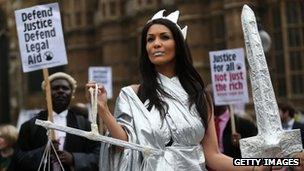Legal aid cuts criticised by Treasury Counsel and Bar Council
- Published
- comments

The planned cuts have attracted a series of protests
Government plans to cut legal aid in criminal cases have been criticised by an elite group of barristers used by it to prosecute the most serious crimes.
Treasury Counsel, appointed by the attorney general, said the cuts - £220m from a yearly budget of £1bn for criminal cases - were unsustainable.
The Bar Council and the Law Society also criticised the plans.
But the Ministry of Justice said savings were needed to ensure the system could help those most in need.
A final consultation on proposed cuts to legal aid in criminal work in England and Wales closed on Saturday.
Legal aid costs taxpayers about £2bn every year - half goes on criminal defence and the rest on civil cases including mental health, asylum and family law involving domestic violence, forced marriage or child abduction.
'Cuts before justice'
Government proposals include cutting fees in complex, high cost cases by 30%, and in other crown court work by up to 18%.
Treasury Counsel said the "entirely obvious and predictable outcomes will be lost quality and reduced supply of criminal advocates".
Meanwhile, the Bar Council, which represents barristers in England and Wales, accused the government of putting "cuts before justice".
Maura McGowan QC, chairwoman of the Bar, told BBC Radio 5 live there was clear evidence that standards were at risk.
"The fees that are paid to people who do these cases have been reduced by almost as much as 40% already, before the planned reductions," she said.
"It will drive people of quality out of the system and will mean those who depend on publicly funded representation run the risk of getting a lower standard.
"So to say that they're making these cuts because they want to protect those who most need help, cannot be right."
'Maintain quality'
The Law Society, which represents some 130,000 solicitors in England and Wales, said it had some concerns about proposals for flat fees in magistrates' courts and the crown court and a single national fixed fee for police station work.
Law Society President Nicholas Fluck said: "To maintain quality, it is vital that we have the most diverse range of solicitors possible in the system within the boundaries of long-term financial viability.
"The current proposals for a single national fixed fee for police station work will have a disproportionate effect on firms in high-cost areas where the cost of doing business is greater.
"It is unwise to risk tarnishing the respect in which our justice system both domestically and internationally is held by an apparent incentive to plead guilty, which could jeopardise the relationship of trust between clients and solicitors."
The MoJ said the cut in high cost cases was to ensure it would impact high earners and not junior barristers, and denied other cuts were unjust.
'Generous' system
An MoJ spokeswoman said: "We have tried to ensure our proposals have more impact on high earners - 70% of criminal barristers contracted to Very High Cost Cases receive fee incomes of over £100,000, which is why we targeted the largest fee reductions at this type of work.
"Nor do we accept our proposed rates for more routine work are unjust. The minimum a QC would be paid for such a case is £306 each day.
"At around £2 billion a year we have one of the most expensive legal aid systems in the world and even after our changes would still have one of the most generous.
"We agree legal aid is a vital part of our justice system and that's why we have to find efficiencies to ensure it remains sustainable and available to those most in need of a lawyer.
"We have engaged constructively and consistently with lawyers - including revising our proposals in response to their comments - and to allege we have not is re-writing history."
- Published16 October 2013
- Published5 October 2013
- Published5 September 2013
- Published9 April 2013